The man who wants to revolutionise France
Emmanuel Macron has promised a “profound transformation” of France. Investors should be sceptical about whether he can succeed, says Frederic Guirinec.
Get the latest financial news, insights and expert analysis from our award-winning MoneyWeek team, to help you understand what really matters when it comes to your finances.
You are now subscribed
Your newsletter sign-up was successful
Want to add more newsletters?

Twice daily
MoneyWeek
Get the latest financial news, insights and expert analysis from our award-winning MoneyWeek team, to help you understand what really matters when it comes to your finances.

Four times a week
Look After My Bills
Sign up to our free money-saving newsletter, filled with the latest news and expert advice to help you find the best tips and deals for managing your bills. Start saving today!
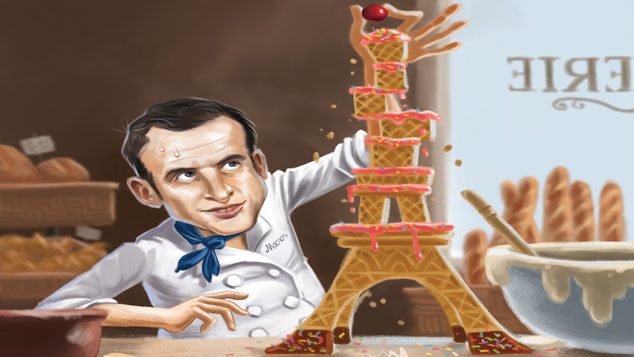
Emmanuel Macron has promised a "profound transformation" of France. Investors should be sceptical about whether he can succeed, says Frederic Guirinec.
"All my life, I have had a certain idea of France," wrote Charles de Gaulle, the president who created the modern French Republic, at the beginning of his War Memoirs. "Instinctively, I have the feeling that Providence has created her either for complete success or for exemplary misfortunes."
Yet for the last few decades France has not matched de Gaulle's vision, slumping instead into an unremarkable mediocrity. The French economy has been stuck in the doldrums since the early Eighties and the country has become the latest sick man of Europe (a title that has at various times been applied to practically every country on the continent). Since 2000 economic growth has hardly averaged above 1.2% per year and even slumped to just 0.6% during the tenure of Franois Hollande, the highly unpopular former president.
MoneyWeek
Subscribe to MoneyWeek today and get your first six magazine issues absolutely FREE

Sign up to Money Morning
Don't miss the latest investment and personal finances news, market analysis, plus money-saving tips with our free twice-daily newsletter
Don't miss the latest investment and personal finances news, market analysis, plus money-saving tips with our free twice-daily newsletter
French industry is struggling against competition from Germany, with its reputation for quality, rising central Europe, and even rejuvenated Spain. The agricultural sector is moribund. Paris trails London in areas such as financial services. France still has its strengths: amazing infrastructure, a sound legal environment and one of the highest levels of productivity (output per hour worked) in the world. But in many respects, it is rapidly losing ground.
Enter Emmanuel Macron, the new president, with grand ambitions to reform France. Macron, a former investment banker, had served as finance minister under Hollande, but has never before held elected office. Running as an independent, he saw off candidates from the Republicans and the Socialists, the dominant political parties in the French system. Yet he is likely to find that getting into the Palais de l'lyse will be far easier than tackling the malaise that helped put him there.
Behind the decline
The reasons for France's structural decline are many, but broadly, they include high taxation, an inflexible job market and the impact of the euro.
First, take tax. "The state is that great fiction by which everyone tries to live at the expense of everyone else", French economist Frdric Bastiat once said and that remains true in France today. Public spending represents 57% of GDP, a world record among major economies, helping to employ a sprawling army of 5.5 million civil servants. Public debt is on course to reach 100% of GDP. No government has managed a budget surplus since 1974.
The World Economic Forum ranks France 124th out of 138 countries in terms of total taxation of corporate profits, an appalling impediment to growth. Worse, large companies may be able to generate most of their profits abroad and use elaborate tax structures to duck the burden, meaning that the impact falls mostly on smaller firms who are hindered by high taxes and expensive labour. Meanwhile, taxation on savings for individuals is close to 60% for high earners.
Hollande's government attempted to increase the burden further. In 2012 he raised taxes, squeezing the middle class, at which point his popularity immediately collapsed. This was still not enough to plug the gaps in the budget. Last month the Cour des Comptes, which vets the public-sector finances, pointed out a €9bn hole in the 2017 budget and harshly criticised the budgetary management of the Hollande administration.
Meanwhile, the unemployment rate stands at 9.6% amid structural problems in the labour markets. The strong protection accorded to workers who have permanent contracts hinders labour mobility, while the complex labour code restricts flexibility. This system penalises the vulnerable, especially the young, who struggle to find jobs and are often employed on short-term contracts.
France has been unable to reform this system because governments have had a fear of massive demonstrations since the mid-1990s, when wide-ranging strikes and protests forced Alain Jupp, the prime minister at the time, to abandon his proposed reforms. Trying to keep at least one promise, Hollande focused on slowing the increase of unemployment. The introduction of the competitiveness and employment tax credit and a new labour law brought some welcome tax cuts and flexibility. But much more remains to be done.
Finally, we have the euro. The single currency was tailored for Germany and is suffocating France and southern Europe, making their products expensive. The last time the French trade balance was positive was 1997 and it has worsened steadily since then.In 2016 French exports and imports reached €453bn and €501bn respectively. This resulted in a trade deficit of €48bn, only a small improvement compared with the €71bn record in 2011, despite a weaker euro and lower commodity prices. Meanwhile, Germany recorded a trade surplus of €297bn, at the expense of the rest of the eurozone.
The euro exacerbates France's lack of competitiveness, since France can't devalue its way out as it did in the past (by relying on a weaker franc to boost export competitiveness). At the same time, the low interest rates that have followed the introduction of the currency union have allowed it to borrow cheaply, preventing necessary reforms.
Not so popular
These are the problems that Macron must address. Whether he will succeed in doing so remains an open question. Despite media enthusiasm for their golden boy, most French have low expectations and many did not vote. The electorate gave him carte blanche par dfaut, mainly to get rid of the politicians (and their wives or children) who have hung on to their seats since the Eighties and Nineties. Marine Le Pen, on the far right, and Jean-Luc Mlenchon, on the far left, scored a combined 40% in the first round of the French presidential elections. Like Macron, they are outsiders benefiting from this wave of dissatisfaction or "dgagisme".
After winning the presidency, Macron's party and his allies won a majority in parliamentary elections in June (the biggest landslide since de Gaulle in 1958), ushering in a parliament of inexperienced but motivated MPs. This is likely to result in a technocratic government, with Macron having Jupiterian powers and MPs voting at his command. In addition, 20% of the conservative Republican party is willing to support Macron; his prime minister, douard Philippe, and economy minister, Bruno Le Maire, are both drawn from this group. The French political elite has always dreamed of a coalition government, similar to those in Germany, which could facilitate reforms, as no particular party would be blamed for unpopular decisions. Macron's victory provides this opportunity.
Macron's programme is still unclear, but it does not seem highly ambitious. One has the feeling that he simply tells his audience what they want to hear. He says he will reduce public spending by €60bn, without providing details, while also increasing public investments. He plans to cut taxes by €33bn, half for companies and half for households. Still, at least no fiscal shock is expected and the finance minister, Bruno Le Maire, has underlined the necessity for spending cuts.
Points of interest
Despite my scepticism, a few points are interesting. First, Macron is a europhile and wants a pan-eurozone finance minister who would approve or reject the budget of each member state. Members of the eurozone will have to forgo a large part of their autonomy. This is needed to save the euro. Second, the tax pressure on businesses should be slightly reduced. Corporate tax is expected to decrease from 33.3% to 25%. Potential higher taxation on households could weigh on domestic demand, but the French have a very high saving rate of 15%, which may reduce the impact. Macron has promised to decrease tax on savings for high earners, introducing a flat tax of 30% on savings, while Prime Minister Philippe said this week that the government may introduce tax breaks for the wealthy to encourage entrepreneurs.
Third, Macron will at least address the rigidities of the labour code as early as this summer, and will accelerate the elimination of economic rents and privileges in labour markets. Inspiration will come from Germany's successful Hartz reforms in 2003. This will result in a two-tier France, with one part thriving with globalisation or being protected from it and the other part competing for contracts and jobs, but will give young people the opportunity to access the job market.
However, this will be a cultural shock, while Macron's stated willingness to accept more migration between France and Algeria to lower employment costs for French companies may result in more social and racial tensions, and exacerbate the country's current identity crisis.
Lastly, Macron has promised to review the pension system and end some generous pensions (such as those enjoyed by MPs). This is necessary, but previous governments have failed to do so, fearing unpopularity and demonstrations. "A financier has no regret nor remorse. They simply have fear," quipped the film director Michel Audiard. Will Macron fear the street too much?
None of this is likely to have an immediate impact on France's prospects. Reviving growth will be challenging, although it is expected to crawl to 1.5% next year, up from 1.1% in 2016, on the back of global growth. Reform will be a Herculean task. While Macron's victory has given him the power to do so, he may disappoint as previous governments have done. He has already started to postpone tax cuts due to large deficits left by the Hollande government (to which he belonged, it should be remembered).
Necessary changes may worsen the divide between the young and people on the fringe of society on one side, and the pensioners, civil servants and those who benefit from globalisation. And it may not be wise to give up sovereignty to the EU while France is going through an identity crisis. "Our country must aim high and hold itself straight, on pain of mortal danger," wrote de Gaulle. "France cannot be France without greatness." For all the adulation Macron has received, it is highly uncertain whether he has the ability to restore de Gaulle's vision.
Five French stocks to buy
The wider French market is expensive, on a cyclically adjusted price/earnings (p/e) ratio of 19.5, and iconic global companies such as cosmetics firm L'Oral and luxury goods group LVMH are almost without exception expensive. But regardless of this and of whether Macron fully achieves his grander ambitions, there remain a few interesting prospects among larger French companies.
Renault (Paris: RNO), for example, is the third-largest car producer in the world and could soon be the largest in conjunction with its partner, Japan's Nissan. The product range of the two firms is fairly new and profitable. They are restructuring Mitsubishi, jump-starting Lada, and investing in electric cars. Renault's sales grew by 16% in the first quarter, four times the market trend. It has improved net operating margins to 6.4%, which is good for the sector, and trades on a p/e of 5.75 forecast earnings.
Telecoms satellite operator Eutelsat (Paris: ETL) is also worth a look. It enjoys strong margins (22% operating margin) and generates steady cash flow, allowing it to fund a 4.7% dividend yield. The firm managed to refinance its high level of debt last November and launched a new satellite, Eutelsat 172B, last month. Its competitor Intelsat is struggling with a colossal debt load and some consolidation seems likely in the sector.
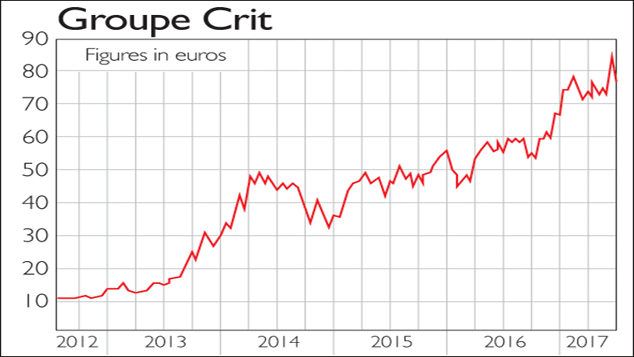
If Macron's reforms are successful, the main beneficiaries are likely to be France's smaller and medium-sized companies. These stocks have enjoyed a strong first half of the year due to these expectations, with firms such as Teleperformance SE (outsourcing), Ipsen (healthcare) and Ubisoft (video games) performing well. Wendel and Eurazeo, which I recommended in January, have also performed nicely. It is harder to find compelling value today, but Groupe Crit (Paris: CEN), which provides temporary employment and recruitment services, could see significant upside if the labour market is deregulated. The company has low leverage, trades on an attractive p/e of 12.5 and has grown revenues by an annual average of 12% since 2014.
At the even smaller end of the scale, Damartex (Paris: ALDAR) is a clothing retailer catering to women aged over 55, with much of its sales coming from catalogue and online channels. Demographics should work in its favour as the population ages. It trades on an attractive p/e ratio of 14. Food producer Tipiak (Paris: TIPI) is seeing reasonable growth and trades on a p/e ratio of 16.
There are a number of innovative smaller listed firms, testifying to the quality of French innovation and research and development, including Balyo, which produces autonomous trucks; Abivax, which aims to create vaccinations against Aids and ebola; Txcell, focusing on auto-immune diseases; and Biophitis, which develops drugs against degenerative age-related diseases. All are potentially interesting, but carry significant risks.
Get the latest financial news, insights and expert analysis from our award-winning MoneyWeek team, to help you understand what really matters when it comes to your finances.
Frederic is an investment analyst. He started his career at JP Morgan in Paris. He has more than ten years of experience investing in private equity and also worked with the 3i debt management team investing in private debt. He is an ACCA member and a CFA charterholder. He graduated from Edhec Business School.
-
 Average UK house price reaches £300,000 for first time, Halifax says
Average UK house price reaches £300,000 for first time, Halifax saysWhile the average house price has topped £300k, regional disparities still remain, Halifax finds.
-
 Barings Emerging Europe trust bounces back from Russia woes
Barings Emerging Europe trust bounces back from Russia woesBarings Emerging Europe trust has added the Middle East and Africa to its mandate, delivering a strong recovery, says Max King
-
 Governments will sink in a world drowning in debt
Governments will sink in a world drowning in debtCover Story Rising interest rates and soaring inflation will leave many governments with unsustainable debts. Get set for a wave of sovereign defaults, says Jonathan Compton.
-
 Why Australia’s luck is set to run out
Why Australia’s luck is set to run outCover Story A low-quality election campaign in Australia has produced a government with no clear strategy. That’s bad news in an increasingly difficult geopolitical environment, says Philip Pilkington
-
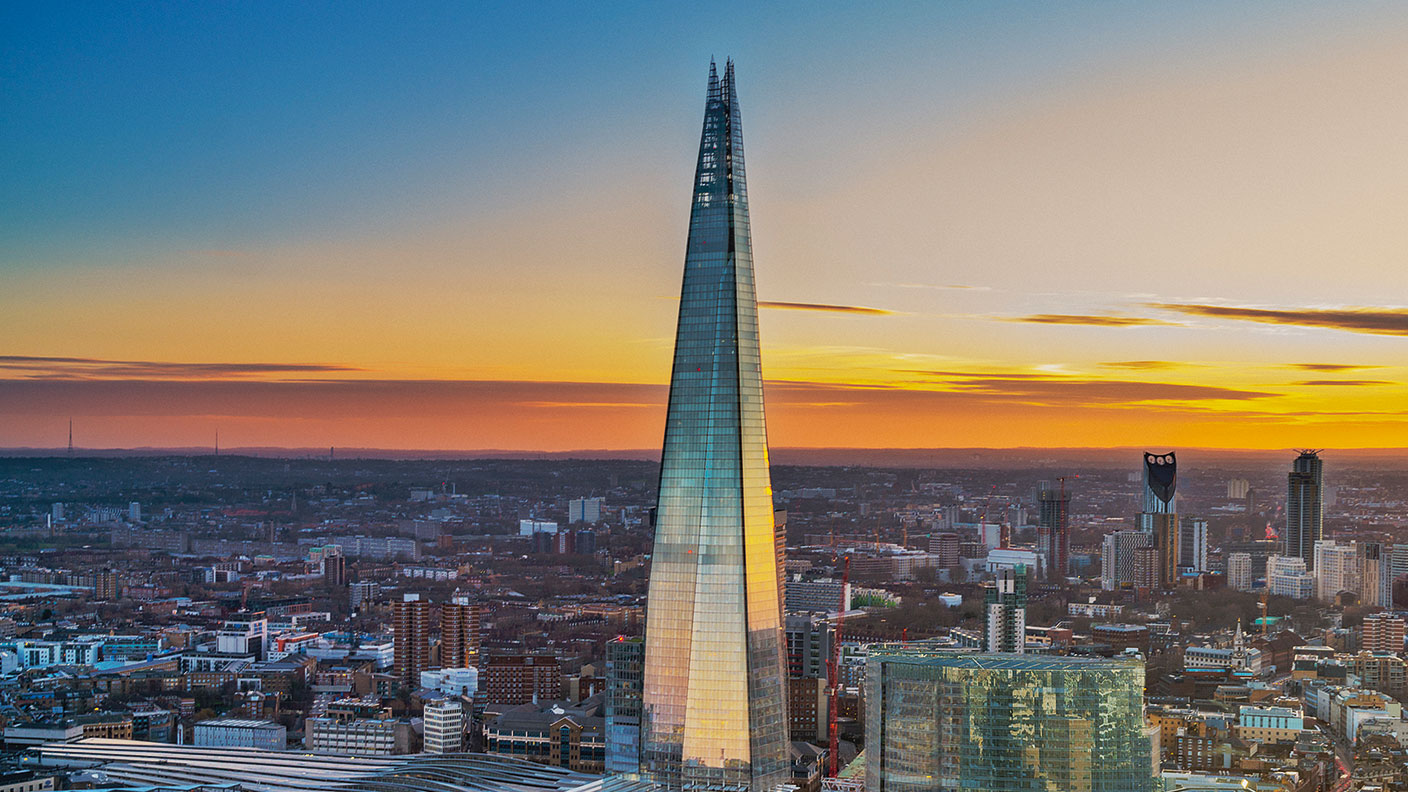 Why new technology is the future of the construction industry
Why new technology is the future of the construction industryCover Story The construction industry faces many challenges. New technologies from augmented reality and digitisation to exoskeletons and robotics can help solve them. Matthew Partridge reports.
-
 UBI which was once unthinkable is being rolled out around the world. What's going on?
UBI which was once unthinkable is being rolled out around the world. What's going on?Cover Story Universal basic income, the idea that everyone should be paid a liveable income by the state, no strings attached, was once for the birds. Now it seems it’s on the brink of being rolled out, says Stuart Watkins.
-
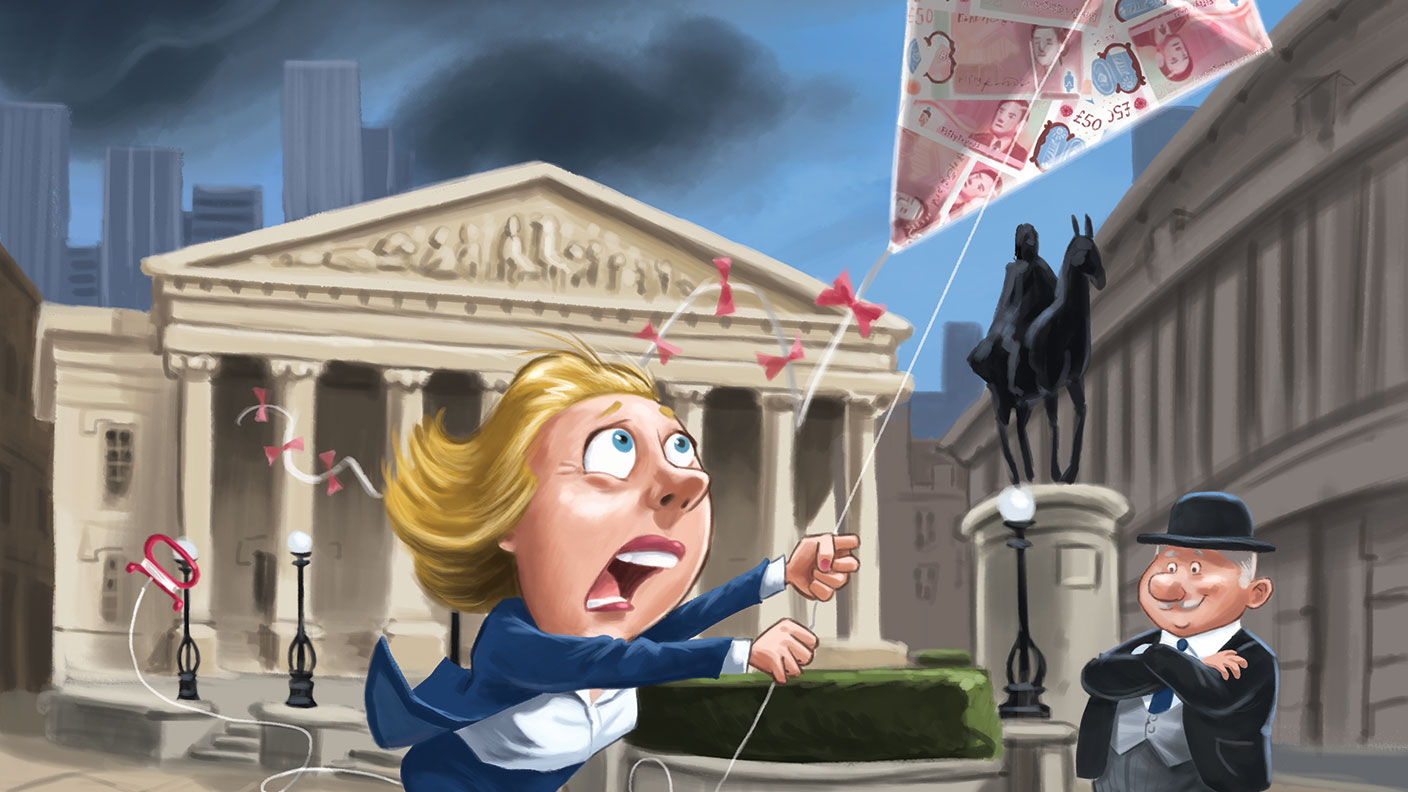 Inflation is here to stay: it’s time to protect your portfolio
Inflation is here to stay: it’s time to protect your portfolioCover Story Unlike in 2008, widespread money printing and government spending are pushing up prices. Central banks can’t raise interest rates because the world can’t afford it, says John Stepek. Here’s what happens next
-
 Will Biden’s stimulus package fuel global inflation – and how can you protect your wealth?
Will Biden’s stimulus package fuel global inflation – and how can you protect your wealth?Cover Story Joe Biden’s latest stimulus package threatens to fuel inflation around the globe. What should investors do?
-
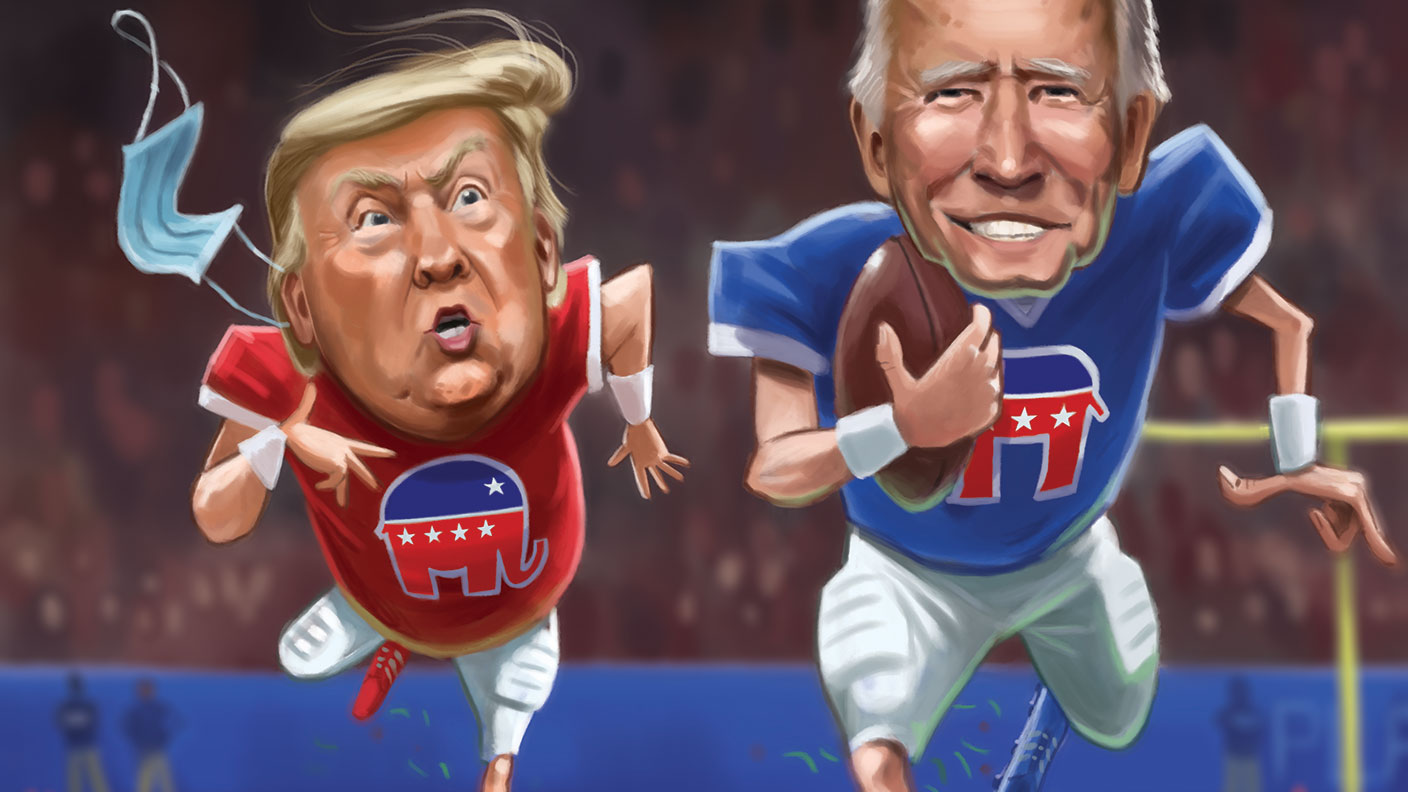 What the race for the White House means for your money
What the race for the White House means for your moneyCover Story American voters are about to decide whether Donald Trump or Joe Biden will take the oath of office on 20 January. Matthew Partridge explains how various election scenarios could affect your portfolio.
-
 What’s worse: monopoly power or government intervention?
What’s worse: monopoly power or government intervention?Cover Story Politicians of all stripes increasingly agree with Karl Marx on one point – that monopolies are an inevitable consequence of free-market capitalism, and must be broken up. Are they right? Stuart Watkins isn’t so sure.